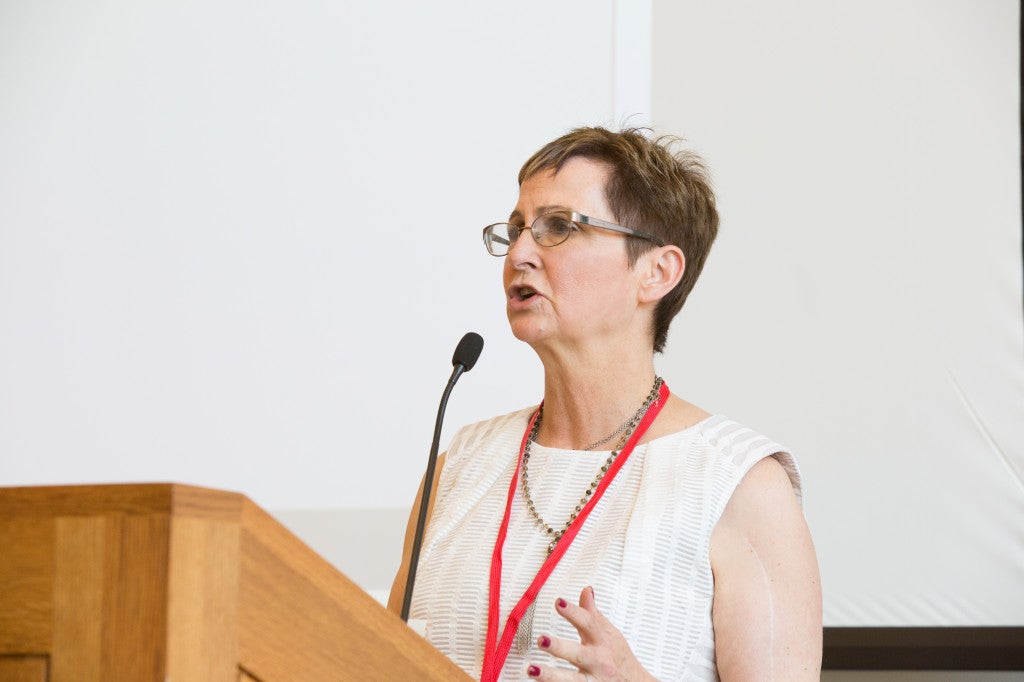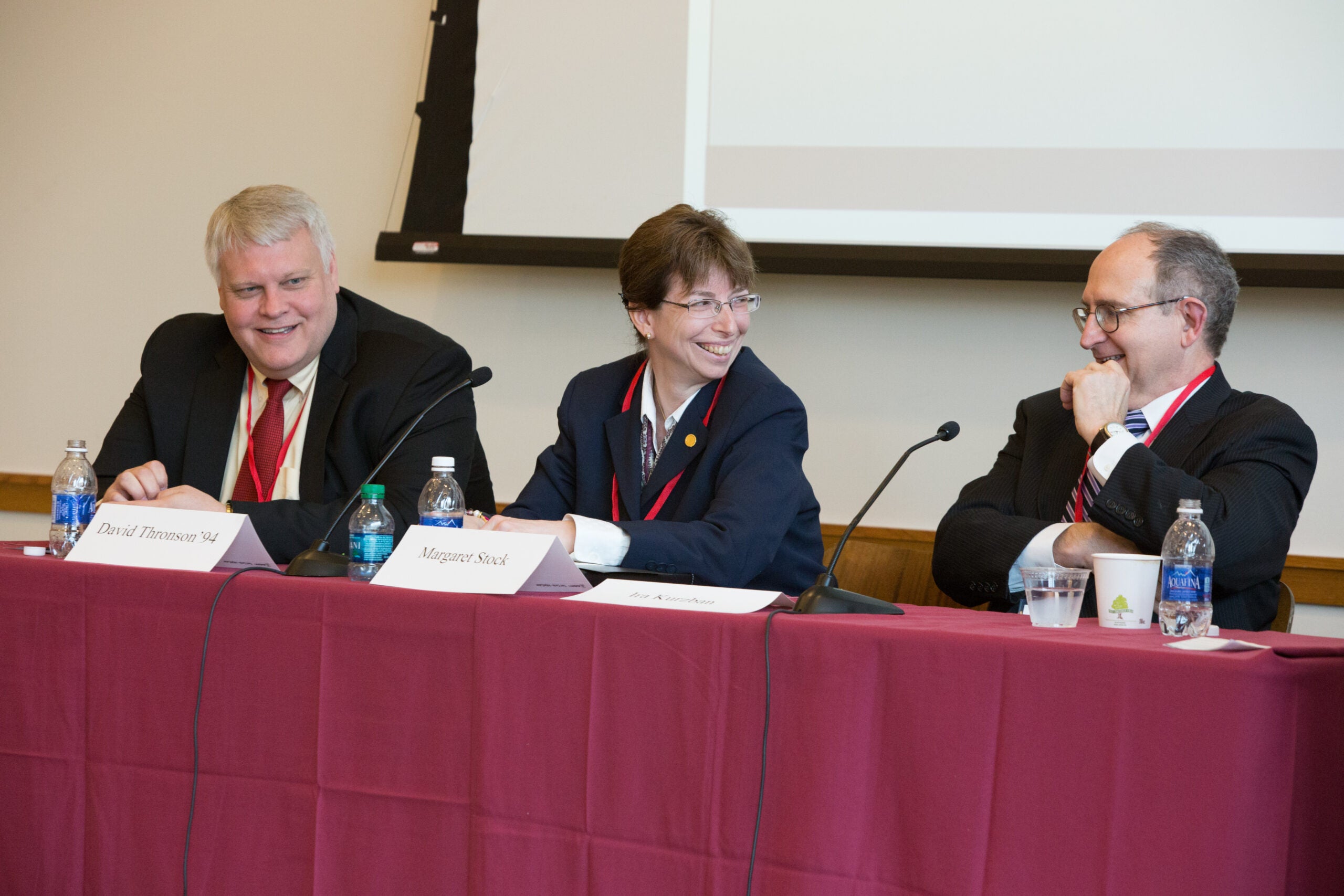
On June 17, about 200 Harvard Law School alumni and students gathered to mark the 30th anniversary of the Harvard Immigration & Refugee Clinical Program (HIRC).
It was a celebration of “30 Years of Social Change Lawyering,” and it brought together advocates from around the country and the world. They discussed progress and milestones in immigration lawyering, and they imagined reforms to the immigration system and ways to provide more much-needed legal representation for immigrants and refugees.
Judge John Thomas Noonan Jr. ’54, of the U.S Court of Appeals for the 9th Circuit, gave the keynote address at the daylong conference.
The clinic’s founder and director, Clinical Professor Deborah Anker LL.M. ’84, introduced Noonan, who spoke via Skype from California. She said that his famous decision in the asylum case of Olimpia Lazo-Majano has inspired all her work. Noonan understood long before others that gender could be a factor in asylum, she said, and that a poor woman from El Salvador who was a sex and domestic slave of an army sergeant was expressing a political opinion by her resistance. “It is a still a wonderful, alive decision,” Anker said.
Noonan had hoped to travel to Cambridge for the event, but at 87, he was unable to make the trip. He congratulated HIRC on its milestone anniversary and said it has made the legal system “an instrument of compassion … They have put the power of law at the service of the poor and the persecuted.”
I have always wondered, why they are called law schools? Why aren’t they called justice schools? The Harvard Immigration and Refugee Clinic is a justice school.
Martha Minow
Noonan spoke about his 1987 written opinion in Olimpia Lazo-Majano v. Immigration and Naturalization Service. He briefly recounted the facts of the asylum case. In 1981, domestic worker Lazo-Majano was left alone in El Savador with her three children after her husband fled the country for political reasons. The next year, she was summoned to the home of an army sergeant who asked her to wash his clothes. After working for him for six weeks, Olimpia said, “With a gun in his hand, he made me be his.” The sergeant raped, beat and tortured her for months, and threatened to kill her if she told anyone.
She eventually escaped to the United States where she applied for asylum. The immigration judge denied her request, and the Board of Immigration Appeals upheld the judge’s decision and dismissed her appeal.
Noonan reversed the decision, finding that “[p]ersecution is stamped on every page of this record.” He also found that the persecution was an act of an agent of the government. And because Lazo-Majano had been told by the sergeant that she was a “subversive” she suffered persecution because of a political opinion.
One judge on the three-judge panel dissented, writing that “the majority has outdone Lewis Carroll in its application of the term ‘political opinion’ and in finding that male domination in such a personal relationship constitutes political persecution.”
Noonan recalled that the chief judge was so taken aback by the tone of the dissent, that he took the unusual position of speaking to the dissenting judge and telling him, “Go home and read the dissent to your wife.” “I don’t believe this advice was heeded,” Noonan said.
Noonan reported that the case was “alive and well,” having been cited in numerous district court and court of appeals decisions and more than 1,000 times in briefs.
Preparing to speak to the HIRC celebration inspired Noonan to take the unusual move of following up with a litigant. With the help of a court librarian, he located Olimpia Lazo-Majano and “had the distinct pleasure of speaking to her…She responded graciously, even complementing me on my elementary Spanish,” said Noonan. And she told him that in August 2008, she became a U.S. citizen.
Noonan concluded by acknowledging the enormity of the immigration caseload and the paucity of immigration judges. In 2010, the American Bar Association commissioned Arnold & Porter to present a comprehensive review of the immigration system. “The problems of the study cry out,” said Noonan. “Why are they not addressed?” The money needed is significant, he said, but not beyond federal resources.
“At the root is the immunity of elected lawmakers from those who cannot vote,” said Noonan. The consciousness and consciences of legislators need to be invigorated, he urged, saying that individual cases can serve this purpose. “Olimpia Lazo-Majano’s successful journey to citizenship lights the way.”
Throughout the day, immigration lawyers and judges spoke about their work experience and their strategies for advancing immigrants’ rights. At least one panelist was also a former client of Anker’s. Los Angeles attorney Bernard Wolfsdorf, who moderated the day’s first panel, had been represented by Anker after fleeing to the United States from South Africa.
Nancy Kelly and John Willshire Carrera, co-directors of HIRC at Greater Boston Legal Services, delivered closing remarks. They have worked together—and with Anker—for all of the clinic’s 30 years. They reflected on how the clinic’s work has had a global impact, including helping women who were victims of political rape in Haiti and unaccompanied minors from Africa. A major local effort grew out of a raid on a New Bedford factory in 2007. They leveraged the wide network of the HIRC community to help free many of those workers from federal immigration detention in Texas.
Kelly and Willshire Carrera imagined what the next 30 years may hold for the clinic. “We’re facing a border crisis right now,” Kelly said, which in turn is creating a crisis in how immigration lawyers will address the immense number of cases and provide representation—to adults and a growing number of unaccompanied minors. Willshire Carrera noted that many of these women and children are fleeing violence by gangs that are really more like quasi-armies.
Anker extended her gratitude to the clinic’s staff. And she presented a special award to Cleary Gottlieb. The firm sponsors the Cleary Gottlieb Summer Fellowship, to support a law student working in the clinic each summer.
Additional panel and speaker information:
Welcoming Remarks by Deborah Anker and Dean Martha Minow
Plenary Panel: Immigration Representation and Access to Justice
Moderator: C. Mario Russell, Catholic Charities of the Archdiocese of New York
Panelists: Honorable Robert A. Katzmann, U.S. Court of Appeals for the Second Circuit; Honorable Norman H. Stahl ’55, U.S. Court of Appeals for the First Circuit; Honorable Robin E. Feder (Personal Capacity), Executive Office for Immigration Review; Ethan Taubes, Newark Asylum Office, U.S. Citizenship & Immigration Services
Lunch Panel: How Has HIRC Shaped Alumni?
Moderator: Rebecca Maxey, Law Offices of Rebecca L. Maxey
Panelists: Eleanor Pelta ’86, Morgan, Lewis & Bockius; Rosemary Byrne ’92, Associate Professor, Trinity College Dublin School of Law; Nikki Flores ’11, Associate Counsel, U.S. Citizenship & Immigration Services
Plenary Panel: Strategies for Advancing Immigrants’ Rights
Moderator: Sheela Murthy ’87, Murthy Law Firm
Panelists: Stephen Legomsky, John S. Lehmann University Professor, Washington University School of Law; Lee Gelernt, Deputy Director of the Immigrants’ Rights Project, American Civil Liberties Union; Mark Fleming ’97, Wilmer Cutler Pickering Hale and Dorr
